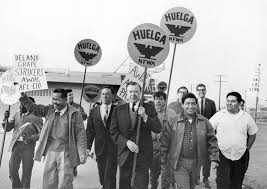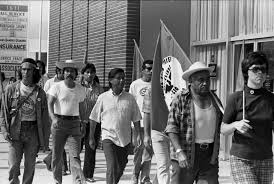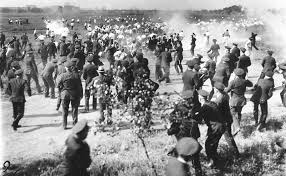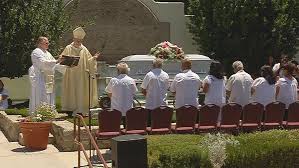César Chávez Day, celebrated annually on March 31st, is a time to honor the life and contributions of one of the most influential labor leaders and civil rights activists in American history. Chávez dedicated his life to improving the working conditions of farmworkers, advocating for social justice, and ensuring that the voices of marginalized communities were heard. His relentless pursuit of equality, dignity, and better treatment for agricultural workers transformed not just the lives of thousands of people, but the very fabric of American labor and civil rights movements.
Who Was César Chávez?
Born on March 31, 1927, in Yuma, Arizona, César Chávez grew up in a family of migrant farmworkers. His early years were spent moving across the American Southwest, following the agricultural seasons and experiencing firsthand the hardships that workers faced. The Chávez family endured extreme poverty, poor living conditions, and abusive working environments—experiences that left a lasting impression on the young César and would later shape his life’s work.

After serving in the U.S. Navy during World War II, Chávez returned to California and began working as a community organizer, where he met other influential leaders such as Dolores Huerta, with whom he co-founded the United Farm Workers (UFW) in 1962. The UFW, originally called the National Farm Workers Association (NFWA), was created to address the unjust conditions faced by farmworkers, including long hours, low wages, dangerous working environments, and lack of basic rights.
The Farmworker Movement
César Chávez’s approach to activism was rooted in nonviolence and civil disobedience, inspired by leaders like Mahatma Gandhi and Dr. Martin Luther King Jr. Chávez believed in peaceful resistance as a means to bring about change. His methods included organizing strikes, boycotts, marches, and fasting. One of his most well-known campaigns was the Delano Grape Strike, which began in 1965 in California’s Central Valley.

The strike was initiated by Filipino farmworkers who were seeking better wages and working conditions. Chávez and the NFWA joined forces with the strikers, calling for a nationwide boycott of table grapes. For five years, farmworkers faced violent opposition from growers and law enforcement, but the boycott gained widespread support, including from labor unions, religious groups, and civil rights activists. In 1970, the growers finally signed a contract with the UFW, recognizing the union and agreeing to improve wages and working conditions.
Another major victory for Chávez and the UFW was the 1973 grape boycott, which helped push for the passage of the Agricultural Labor Relations Act in California. This law, considered a groundbreaking achievement, established a process for farmworkers to organize and negotiate collective bargaining agreements with their employers. Chávez’s commitment to labor rights and the success of the grape boycott earned him widespread recognition as one of the most prominent labor leaders of the 20th century.

Why Celebrate César Chávez Day?
César Chávez Day is not just a day to celebrate a historical figure, but a day to reflect on the ongoing struggles for social justice and workers’ rights. Chávez’s legacy is a reminder that the fight for fair wages, safe working conditions, and human dignity is not over. In many ways, the challenges he faced during his lifetime are still relevant today, particularly in industries where low-wage workers continue to face exploitation and discrimination.
The day is observed in several U.S. states, with California, Arizona, and Texas among the most notable. It’s a day when communities, schools, and organizations come together to honor Chávez’s legacy through events like parades, rallies, educational programs, and volunteer service. Schools use this day to teach students about Chávez’s commitment to justice, his leadership skills, and the power of grassroots activism.
Chávez was also an advocate for environmental justice, linking the health of farmworkers with the health of the land. His advocacy for pesticide-free farming and improved working conditions for those handling dangerous chemicals laid the groundwork for future environmental movements, including the push for sustainable agriculture and workers’ health protections in modern-day agriculture.

The Power of Nonviolent Protest
One of the central tenets of César Chávez’s activism was his commitment to nonviolence. Throughout his campaigns, Chávez called for peaceful protest as the means to demand justice. He believed that nonviolent action was the most powerful tool for achieving meaningful social change, drawing from the teachings of figures like Gandhi and King.
Chávez’s nonviolent protests were not only a moral stance but a strategic one. By remaining peaceful, he was able to expose the brutality of those in power, whether it was the growers who exploited workers or the police who used violence to suppress the movement. The UFW’s commitment to nonviolence inspired thousands of people across the country to join in the fight for workers’ rights, regardless of their backgrounds or beliefs.

A Legacy That Lives On
César Chávez’s impact is still felt today in various movements for social justice and workers’ rights. The UFW continues to advocate for farmworkers’ rights, and organizations across the U.S. still use his tactics of nonviolent protest and community organizing to address modern-day injustices. Chávez’s dedication to service, his willingness to sacrifice personal comfort for the betterment of others, and his belief in the dignity of every worker are lessons that remain relevant in today’s world.
As we celebrate César Chávez Day, we are reminded of the power of collective action, the importance of standing up for those who are vulnerable, and the ongoing struggle for justice in the workplace. It’s not only a day to remember a man who dedicated his life to others but also a call to action for us to continue fighting for equality, dignity, and respect for all workers—no matter their background or occupation.

César Chávez once said, “The fight is never about grapes or lettuce. It is always about people.” As we commemorate this day, let us remember that the fight for justice is an ongoing one, and it is up to each of us to carry on his work in our own way.

